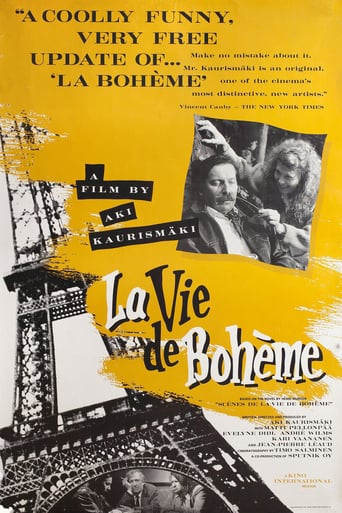Karl Self
This is a hypothermic look at three dropout artists (a writer, a painter, a musician) who live in an undefined time and place (from the look and feel of it, maybe the suburbs of Paris in the 1950ies). The painter (an Albanian) is actually quite good, the writer distinguishes himself by using an overly florid language ("We'll be right back, like arrows thrown by hand."), the musician doesn't know how to play an instrument. They unerringly define themselves as unrecognised (as opposed to untalented) artists, they never have any money, and they give their devoted women a hard time. Kaurismäki portrays them in his unique style which uses pristinely arranged images in conjunction with absurd humour.Some people may not get the point. I loved it. I first saw it when it came out in 1992, which was before the internet. I have since managed to google that the movie is based on the same book as Puccini's opera "La bohème". Kaurismäki adopted the book the other way around than Puccini, whereas the opera is colourful and melodramtic, the movie is dour, black-and-white, and minimalistic -- but also funnier.
poikkeus
Imagine a Finnish director making a film that's as much a tribute to French film as a parody of its worst excesses, and you have a fair idea of what La Vie de Boheme is about. Aki Kaurismaki uses his thoroughly deadpan comic approach to render the lives of a group of pathetic artists in France, none of whom are even close to being artists (except in their own minds). In fact, it's easy for the uninitiated to take the film very seriously, given Kaurismaki's dry comic touch. I caught this at the SF International Film Festival, where a fair part of the audience (including myself) was caught up in laughter - while admiring the painterly black and white photography and perfectly pitched performances. Those uncomfortable with a Jim jarmusch style of post- modernism might even feel lost from time to time. But all of Kaurismaki's film's are comedies, some more outrageous than others, and this one is about as perfect in conception as you might hope.
sir_mercutio_99
La Vie de Boheme is an modern Neo-realistic version of the classic french novella "Scenes la vie de Boheme" a mostly forgotten story from the romantic era. Some people will know the story from the very famous opera "La Boheme" by Puccini. The main difference of this from the opera is that it takes a more direct & modern approach to this. The Bohemians are more working class artists than what we would think of as (lazy)starving artists. In the opera Musetta is more of a gold-digging tramp in contrast Musetta in this movie leaves Marcel(lo) to move in with a more stable man as does Mimi. The only real problem I have with the movie is the absence of the philosopher Colline which is a loss.(He pawns his coat to buy medicine for Mimi.) Other than that I would recommend this film for fans of French neo-realism.
Michael Kerpan (kerpan)
Although Aki Kaurismaki credits Henri Murger's collection of stories as the source for his "La vie de boheme" (1992), the underlying dramatic structure actually comes straight from Puccini's opera "La boheme" (with the central focus of the story of Rodolphe and Mimi). Superb black and white photography, with a droll script delivered by mostly dead-pan (but nonetheless funny) performers -- including beloved regulars like the late Matti Pellonpaa and Kari Vaananen (Kati Outinen, a very appropriate Mimi I would think, was missing, however -- maybe her French was not good enough).



